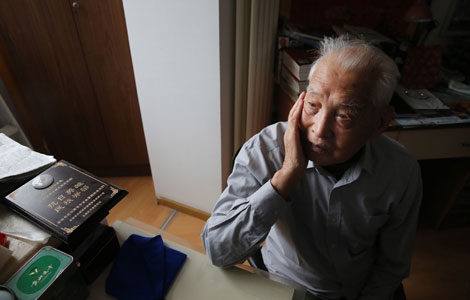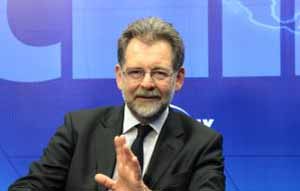Global watchdog approves Syria disarmament plan
Updated: 2013-09-28 08:04
(Agencies)
|
|||||||||||
THE HAGUE - The world's chemical weapons watchdog approved an ambitious and risky accelerated plan to rid Syria of its chemical arsenal at a late night meeting Friday.
The decision by the Organization for the Prohibition of Chemical Weapons (OPCW) paved the way for the U.N. Security Council to adopt a resolution enshrining the plan, which will make it legally binding.
The resolution, already agreed on by the five veto-wielding members, was expected to pass easily late Friday at the United Nations, breaking a nearly three-year deadlock on the council, which had been deeply divided on Syria.
"The good news is there's a decision and we expect to have an advance team on the ground (in Syria) next week," OPCW spokesman Michael Luhan told reporters at the organization's Hague headquarters.
The risks inspectors will face were underscored when a car bomb exploded outside a mosque north of Damascus, killing at least 30 people, the latest victims of a civil war which has claimed more than 100,000 lives and driven another 7 million - around a third of the country's pre-war population - from their homes since March 2011.
Law experts, meanwhile, said discussions were underway to set up a war crimes tribunal for Syria to punish perpetrators from all sides of atrocities.
The agreement in The Hague allows the start of a mission to rid Syria's regime of its estimated 1,000-ton chemical arsenal by mid-2014, significantly accelerating a destruction timetable that often takes years to complete.
"This decision sends an unmistakable message that the international community is coming together to work for peace in Syria beginning with the elimination of chemical weapons in that country," OPCW Director-General Ahmet Uzumcu said in a statement.
The draft Security Council resolution agreed upon Thursday by Russia, China, the United States, France and Britain includes two legally binding demands - that Syria abandon its chemical stockpile and allow unfettered access to the chemical-weapons experts.
If Syria fails to comply, the draft says, the Security Council would need to adopt a second resolution to impose possible military and other actions on Damascus under Chapter 7 of the U.N. charter.
President Barack Obama called the Security Council deal "potentially a huge victory for the international community."
The agreement shaping up for approval Friday represents a breakthrough after 2 years of paralysis in the Security Council.
Diplomatic efforts to find some agreement on Syria gathered momentum in the aftermath of an August 21 poison gas attack that killed hundreds of civilians in a Damascus suburb and Obama's subsequent threat to use military force.
The U.S. and Russia agree that Syria has roughly 1,000 metric tons of chemical weapons agents and precursors, including blister agents such as sulfur and mustard gas and nerve agents like sarin.
Russian Foreign Minister Sergey Lavrov told the U.N. on Friday that progress in Syrian chemical disarmament "should give an impetus to" moves to establish a zone "free of weapons of mass destruction and means of their delivery in the Middle East."
Chinese Foreign Minister Wang Yi told the U.N. General Assembly he hoped the Security Council resolution would be adopted "to support the OPCW in launching the verification and destruction of chemical weapons" in Syria. He said China was prepared to help fund the disarmament mission.
Meanwhile, a group of U.N. inspectors already in Syria investigating the alleged use of chemical weapons said Friday they are probing a total of seven suspected attacks, including in the Damascus suburb where hundreds were killed last month. That number was raised from three sites previously.
Related Stories
China, Russia issue joint statement on Syria 2013-09-26 12:25
UN resolution on Syria's chemical weapons urged 2013-09-26 06:55
Chinese, French FMs meet over Syria 2013-09-25 08:51
China ready to assist Syria with destruction of chemical weapons 2013-09-24 07:17
UN must act on Syria: Kerry 2013-09-20 17:01
China to work with int'l community on Syria 2013-09-18 19:09
Today's Top News
'EU signal needed' for investment agreement
UN, Iran to continue talks
FTZ to define development
US, Russia make deal on Syrian arms draft
Afghanistan seeks active Beijing role
New doors opening for consumer finance firms
Alibaba, HK exchange take listing debate online
Picture brightens for corporate profits
Hot Topics
Lunar probe , China growth forecasts, Emission rules get tougher, China seen through 'colored lens', International board,
Editor's Picks

|

|

|

|

|

|





